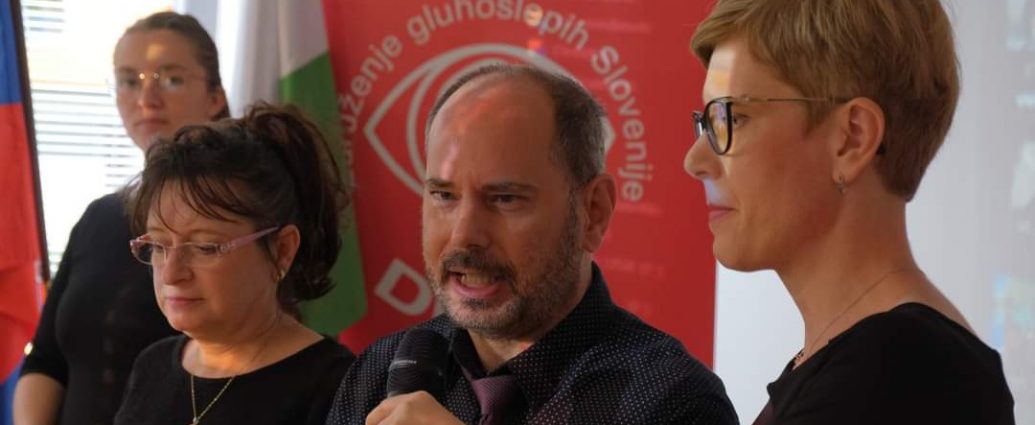We are publishing in full the speech by Tamás Gangl, Vice President of the European Deafblind Union (EDbU), at the celebration of the European Day of the Deafblind at the Deafblind Association of Slovenia DLAN.
The speech is published in full in Hungarian and English.
Hölgyeim és Uraim!
Örömmel fogadtam el a Szlovén Siketvakok Egyesületének meghívását az Európai Siketvak Nap alkalmából szervezett mai eseményre, amit ezúton is köszönök.
Csaknem 20 éves kapcsolat fűzi össze a szlovén és magyar siketvakok szervezetét, támogatjuk egymás munkáját, és még közös nyári táborokat is szerveztünk Magyarországon, illetve éppen 10 évvel ezelőtt itt Szlovéniában.
Számomra nagy öröm látni, hogy az elmúlt csaknem két évtizedben mennyit fejlődött a szlovén egyesület, mennyi eredményt ért el a szlovén siketvak emberekért nem kis küzdelmek árán.
Az Európai Siketvak Unió éppen 20 évvel ezelőtt alakult meg október 22-én.
Az európai szervezet célja a siketvakság mint önálló fogyatékosság elismerése, ezzel együtt független siketvak szervezetek működése, valamint a siketvak emberek életminőségének növelése és társadalmi befogadása minden európai országban.
Szlovénia büszke lehet az eddig elért eredményekre, hiszen Szlovéniában elismerik a siketvakságot mint önnálló fogyatékosságot, illetve a DLAN is független szervezetként küzdhet a siketvak emberek jogaiért.
Hogyan lehet elérni a siketvak emberek életminőségének növelését és társadalmi befogadását?
Ehhez elengedhetetlen a jelnyelv mellett a siketvak emberek által használt kommunikációs módszerek jogi elismerése, siketvak tolmácsok képzése, mivel a siketvak emberek számára nem csak speciális kommunikációs támogatásra, hanem egyben személyi megsegítésre, kísérésre is szükségük van,valamint a magas óraszámban, ingyenesen elérhető tolmácsszolgáltatás.
A rehabilitáció révén a siketvak emberek az állapotuknak és képességeiknek megfelelő önálló életvitelre válnak képessé, hozzáférhetnek az információkhoz, részt vehetnek az oktatásban és munkát tudnak végezni.
A rehabilitációhoz is képzett rehabilitációs tanárokra, jól szervezett, államilag támogatott szolgáltatásra van szükség.
Mindemellett a siketvak emberek számára biztosítani kell a megfelelő segítő technológiákat, segédeszközöket, valamint az akadálymentes környezetet.
Az Európai Siketvak Unió teljes mértékben kiáll a DLAN mellett ezen célok elérésében.
A szlovén siketvak emberek nevében, és mint az Európai Siketvak Unió alelnöke, külön köszönöm a Szlovén Köztársaság Miniszterelnökének kitüntető figyelmét és támogatását, hogy megérti a siketvak emberek nehézségeit, és kormányával törekednek azok mielőbbi megoldására Szlovéniában.
Ehhez kívánok sikeres együttműködést a DLAN és a szlovén kormány között a szlovén siketvak emberek mindennapjainak élhetőbbé tételében.
Köszönöm megtisztelő figyelmüket!
Speech translation:
Ladies and gentlemen!
Ladies and Gentlemen, it was my pleasure to accept the invitation of the Slovenian Association of the Deaf-Blind to celebrate the European Day of the Deaf-Blind, for which I would like to express my gratitude.
Almost 20 years of cooperation and support have linked the Slovenian and Hungarian organisations of deafblind people, we have organised joint camps in Hungary and, exactly ten years ago, in Slovenia. It is a pleasure to see how much the Slovenian organisation of deafblind people has developed in almost 20 years. How much success it has achieved for people with deafblindness in Slovenia, and not with little effort. The European Federation of the Deafblind was founded exactly twenty years ago, on 22 October.
The aim of the European Federation of the Deafblind is to have deafblindness recognised as a disability in its own right, while at the same time organisations for deafblind people can operate independently. It also aims to improve the quality of life of people with deafblindness and the social inclusion of deafblind people in every European country.
Slovenia can be proud of the successes achieved so far, because in Slovenia you recognise deafblindness as a disability in its own right, or the DLAN Association as an independent organisation working for the rights of people with deafblindness. How can we improve the quality of life of people with deafblindness and their social inclusion?
It is inevitable to recognise the many ways of communication for people with deafblindness in addition to sign language, the training of interpreters for people with deafblindness, because people with deafblindness not only need support in specific ways of communication, but also personal assistance and accompaniment for a high number of hours, and the availability of free interpreting services. As a result of rehabilitation, people with deafblindness and their abilities can be strengthened, enabling them to live more independently, to access information, to participate in training and to do appropriate work. Rehabilitation requires trained professionals and well-organised services supported by the state.
In addition to all this, it is necessary to provide the person with deafblindness with appropriate technology, technical aids as well as a barrier-free environment. The European Federation of the Deafblind fully supports DLAN in achieving these goals.
On behalf of Slovenian people with deafblindness, as well as in my capacity as Vice President of the European Federation of the Deafblind, I would like to thank the Prime Minister of the Republic of Slovenia for his exceptional attention and support, and for his understanding of the problems of people with deafblindness. I would also like to thank the Government of the Republic of Slovenia for all its efforts in addressing this issue in Slovenia.
I wish a successful cooperation between DLAN and the Slovenian Government, for the benefit of people with deafblindness to make their everyday life easier.
Thank you for your kind attention!


